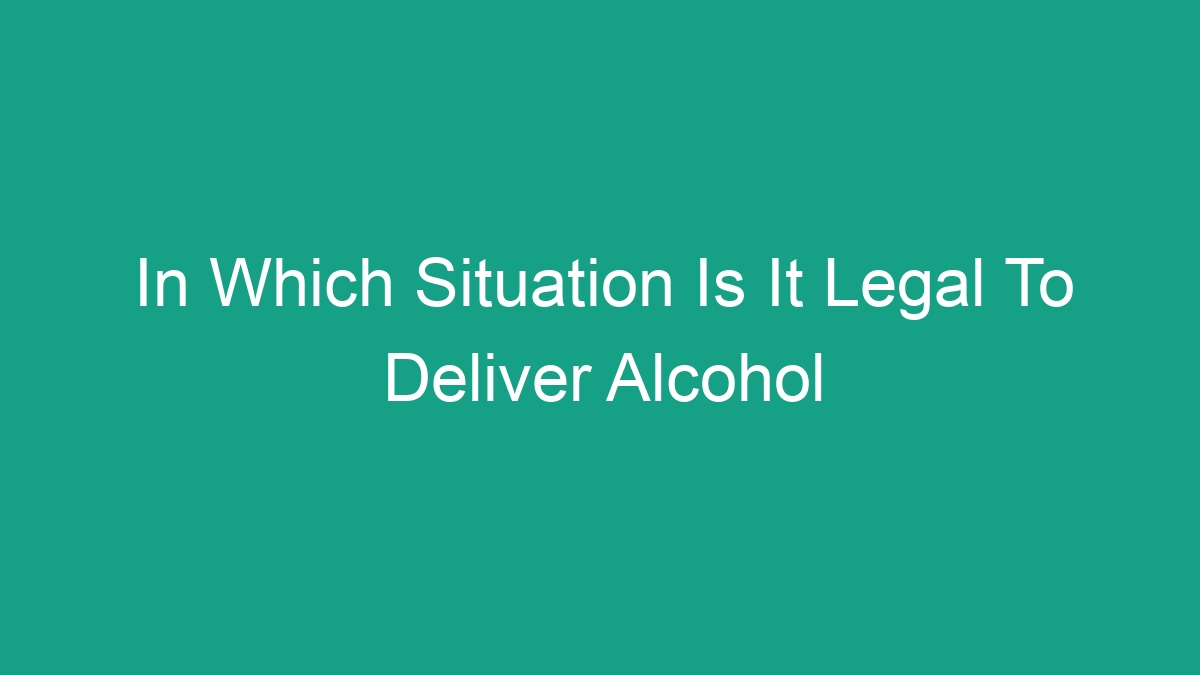
Alcohol delivery has become increasingly popular, especially with the rise of online ordering and food delivery services. However, not all situations allow for the legal delivery of alcohol. Whether you are a consumer or a business owner, it is important to understand the regulations surrounding alcohol delivery to ensure that you comply with the law. In this article, we will discuss the various situations in which it is legal to deliver alcohol.
Legal Age Requirements
Before diving into the specific situations in which alcohol delivery is permitted, it is crucial to acknowledge the legal age requirements. In the United States, the legal drinking age is 21. This means that individuals who are under the age of 21 are not permitted to purchase, possess, or consume alcoholic beverages. Similarly, businesses and delivery services must adhere to age verification protocols to ensure that they are not delivering alcohol to underage individuals.
Retail Store Delivery
Retail stores that hold a valid liquor license are generally allowed to deliver alcohol to consumers. This includes businesses such as liquor stores, wine shops, and breweries. However, it is important to note that state laws vary, and some states may have restrictions or additional requirements for alcohol delivery. For instance, some states may limit the hours during which alcohol can be delivered, while others may require specific permits or licenses for delivery services.
It is crucial for businesses to familiarize themselves with the specific regulations in their state to ensure compliance with the law. Failure to do so may result in legal consequences and jeopardize the business’s ability to deliver alcohol in the future.
Restaurant and Bar Delivery
Similar to retail stores, restaurants and bars with a valid liquor license are typically permitted to deliver alcohol to consumers. This allows patrons to enjoy their favorite alcoholic beverages in the comfort of their own homes. As with retail store delivery, it is essential for businesses to be aware of any state-specific regulations that may impact their ability to deliver alcohol.
In recent years, many states have relaxed their regulations to allow for the delivery of alcohol alongside food orders. This has been a significant development for the restaurant industry, providing an additional source of revenue during challenging times such as the COVID-19 pandemic.
Third-Party Delivery Services
The emergence of third-party delivery services has transformed the way consumers access a wide range of products, including alcohol. Third-party delivery services work with licensed retailers and restaurants to facilitate the delivery of alcohol to consumers. This allows for greater convenience and accessibility, particularly for individuals who may not have easy access to liquor stores or prefer the convenience of doorstep delivery.
It is important to note that third-party delivery services must also comply with state regulations governing alcohol delivery. This includes verifying the age of the recipient and adhering to any specific delivery restrictions imposed by the state. Working with licensed retailers and restaurants is crucial for maintaining legal compliance and ensuring the safety of alcohol delivery.
Special Events and Catering
Special events and catering services may also be authorized to deliver alcohol under certain circumstances. This often entails obtaining special permits or licenses to facilitate the sale and delivery of alcoholic beverages for specific events or occasions. These permits may be issued by state or local authorities and typically involve stringent requirements to ensure responsible alcohol service and delivery.
Businesses that provide catering services must be particularly diligent in understanding the legal requirements for alcohol delivery, as they may be serving alcohol at a wide range of venues and events. Compliance with state and local regulations is essential for avoiding legal penalties and safeguarding the reputation of the business.
Mail Order and Online Sales
The rise of e-commerce has enabled consumers to purchase a wide range of products online, including alcoholic beverages. Some states permit the shipment of alcohol through mail order and online sales, provided that the retailer and consumer are in compliance with state laws. However, it is vital for businesses and consumers to be aware of any restrictions or prohibitions on interstate alcohol shipments, as well as age verification requirements.
It is also important to note that certain states have stricter regulations regarding the shipment of alcohol, and businesses must navigate these complexities to ensure legal compliance. Working with legal and regulatory experts can help businesses navigate the nuances of alcohol sales and shipment laws.
Conclusion
Understanding the legal framework surrounding alcohol delivery is essential for businesses and consumers alike. Whether you are a retailer, restaurant, delivery service, or consumer, it is crucial to be aware of the regulations governing alcohol delivery in your state. Compliance with age verification requirements, licensing, and delivery restrictions is paramount for ensuring the legal and responsible delivery of alcohol.
FAQs
1. Can I legally deliver alcohol as an individual?
While certain states allow for the shipment of alcohol to consumers, it is essential to verify the legality of such actions in your specific location. Additionally, individuals may be subject to age verification and other restrictions when receiving alcohol shipments.
2. What are the consequences of illegally delivering alcohol?
Illegally delivering alcohol can result in severe penalties, including fines, license revocation, and legal ramifications. It is imperative to comply with state and local regulations to avoid these consequences.
3. Are there federal laws governing alcohol delivery?
While the regulation of alcohol primarily falls under the jurisdiction of individual states, federal laws also impact certain aspects of alcohol delivery, particularly concerning interstate shipments and online sales.
By adhering to the legal requirements for alcohol delivery, businesses and consumers can ensure that they are operating within the bounds of the law while responsibly enjoying and providing access to alcoholic beverages.



